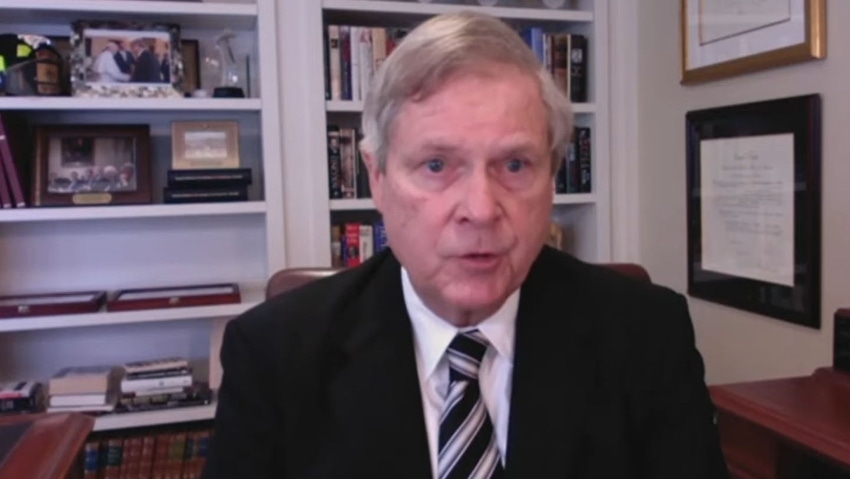Vilsack discusses climate actions, biofuels in nomination hearing
Secretary of agriculture designee Tom Vilsack fields questions from Senate Agriculture Committee during hearing Tuesday.

Giving a nod to Groundhog’s Day, Obama administration Secretary of Agriculture Tom Vilsack again appeared before the Senate Agriculture Committee Tuesday for his nomination hearing to assume the role of ag secretary in the Biden administration. He says he goes into the process recognizing it is a different time, he’s a different person and it is a different department.
During the over 2.5 hours of questioning from ag committee members, Vilsack started off his opening comments identifying the “why not” opportunities for the agricultural industry to embrace, including climate change, food security, expanding markets and addressing inequities.The Senate Agriculture Committee unanimously approved his nomination later in the day Tuesday, clearing the way for a full Senate vote on his nomination anticipated in the coming days.
Climate change was a major theme posed by committee members including Senate Agriculture Committee Chairwoman Debbie Stabenow, D-Mich., who introduced the Growing Climate Solutions Act with Sen. Mike Braun, R-Ind., last year. Stabenow reaffirmed what was included in her bill that whatever is done for farmers must be voluntary, producer-led and bipartisan.
Vilsack says he shares President Joe Biden’s view that agriculture can reach net-zero emissions and by doing so can also provide a competitive edge to increasing domestic and international demand for sustainability. He says many proposals can be implemented administratively on the climate front, including creating an advisory group of farmers to better understand how to structure a carbon bank to adequately measure and quantify actions taken to sequester carbon.
“I think agriculture is the first and best way to begin getting some wins in climate areas,” Vilsack says.
Vilsack says the Commodity Credit Corporation is a great tool to create some kind of structure for providing a carbon market system that pays farmers for actions taken. He also recognizes there are some concerns that a carbon sequestration bank would benefit investors or third-party entities.
“Whatever program we put together has got to include farmer input and at the end of the day benefit farmers. If it does, I think there will be wide adoption,” Vilsack says.
In response to questioning from Braun, Vilsack adds, “I do believe we are on the cusp of series of new market opportunities that will provide greater resilience in the system, more income opportunities for farmers and do right by the environment and create more jobs.” He says he hopes to work with those in Congress and with the president who he believes has the right vision.
“I do believe we have enormous new opportunities that will allow the family farm to stay in business and pass it onto the next generation which I believe most farmers are anxious to do,” Vilsack says.
Biofuels future bright
Another major point of discussion from members on both sides of the aisle includes support for biofuels in questioning from Sens. Amy Klobuchar, D-Minn., Chuck Grassley, R-Iowa, Tina Smith, D-Minn., John Thune, R-S.D., and Joni Ernst, R-Iowa.
Vilsack says the biofuels future looks bright and opportunities exist including to expand marine and aviation inclusion of biofuels. He also says despite a commitment to increase electric vehicles, that too will still require energy and opportunities to promote renewable energy.
“We need an alternative fuel source in addition to and complement our efforts on electric,” Vilsack says. “Over a long period of time we’re going to need both.”
Vilsack’s vocalized commitments to utilizing and increasing resources to build out infrastructure for higher ethanol blends and looking for opportunities to help ethanol producers hurt from the economic fallout of COVID-19.
He also says he would expect this administration to limit the use of the small refinery exemptions that scaled-back blending of biofuels in recent years. The future direction of the Renewable Fuel Standard will also be important for this administration in 2022 when it faces renewal.
Vilsack doesn’t expect he’ll to have to be too persuasive in the Oval Office to have the President stay committed to the RFS and stand to follow through on campaign promises to biofuels. “I think there is a future for this industry.”
“Biofuels continue to play role in reducing emissions and providing job opportunities in all parts of the country,” Vilsack testifies.
Livestock market issues
Several Republican members brought up issues of packer consolidation at the livestock level and cited recent shortfalls revealed during the COVID pandemic on supply chain constraints.
In response to questioning from Grassley, who has introduced a bill to increase market transparency, Vilsack promised to look at every tool available to USDA to ensure openness and transparency in markets. He also says he would consider working collaboratively with the Department of Justice on issues of antitrust if warranted.
“There’s no question we need to strengthen the laws designed to create more openness, more transparency and price discovery,” Vilsack says in response to Sen. John Hoeven, R-N.D. But he says that isn’t enough and also promised to look at ways to promote the expansion of smaller processing facilities.
When one or two processing facilities shut down it created havoc in the market. “We can’t have that. We have to have a more resilient food system and, in my view, we need to look for ways to incent and encourage more processing facilities,” he says.
Another hot topic addressed the Product of USA label and beef producers’ desire to see that strengthened. Vilsack responded that he attempted three different times during his previous tenure to strengthen the country-of-origin labeling but was struck down by the World Trade Organization and would have faced retaliatory measures from Canada.
He says he’s willing to listen to ways to try and create a WTO-compliant labeling system that allows for better information to consumers.
About the Author(s)
You May Also Like



.png?width=300&auto=webp&quality=80&disable=upscale)

